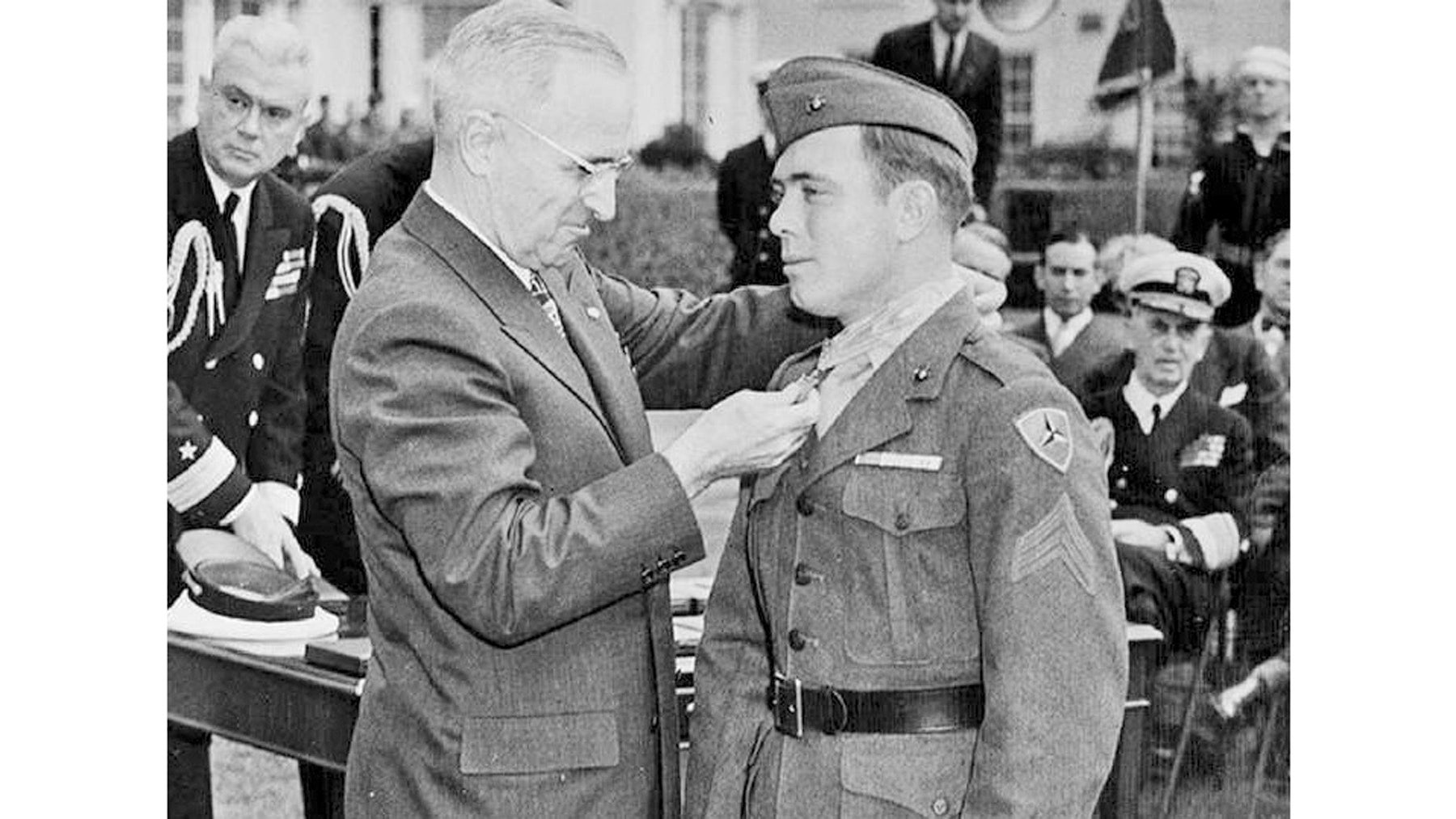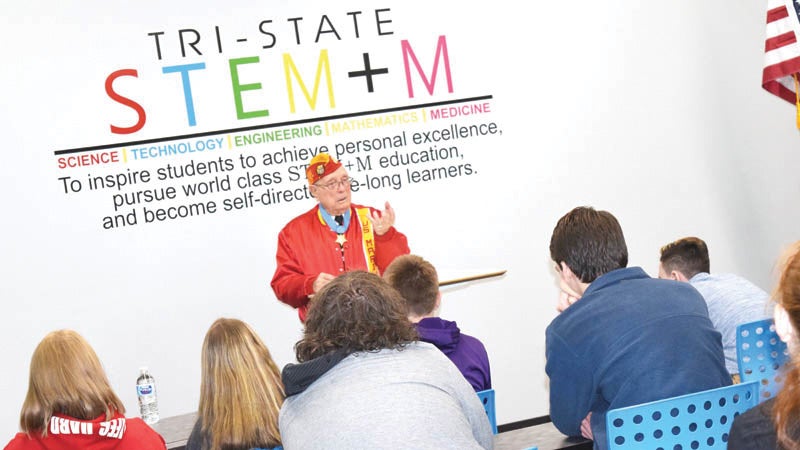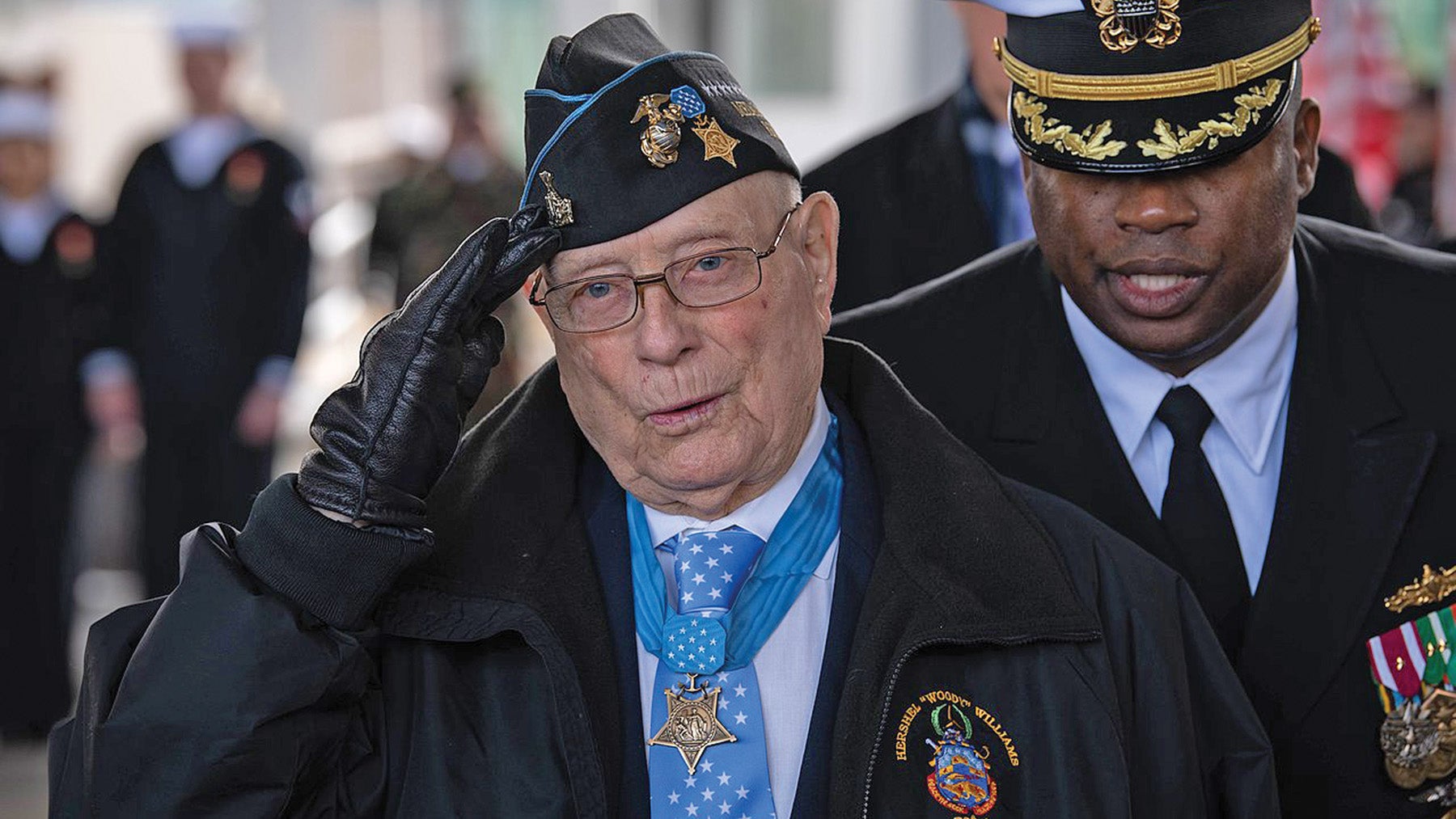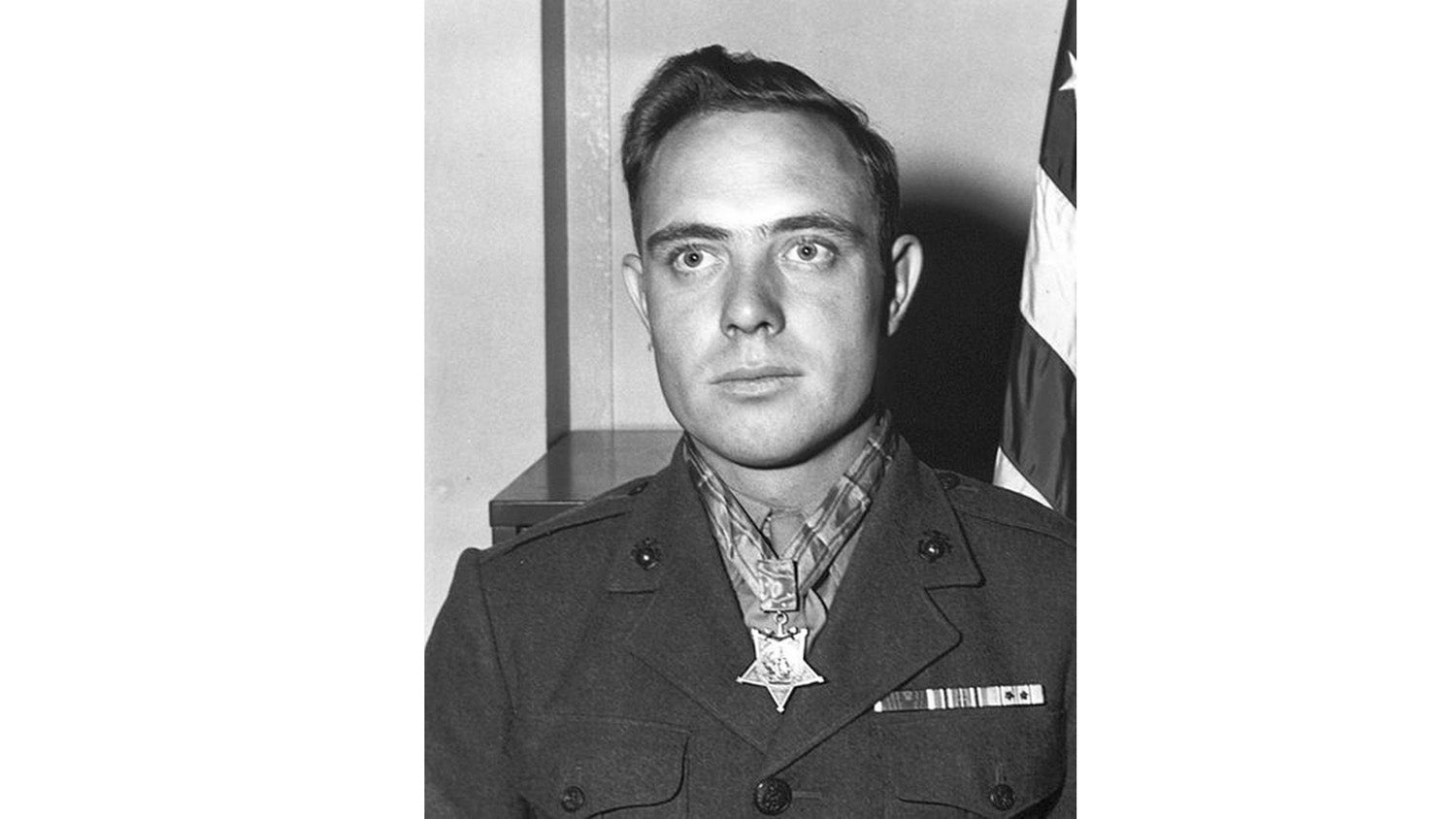WWII Anniversary: The lessons learned — Medal of Honor recipient reflects on upcoming milestone of war’s end
Published 12:00 am Saturday, July 25, 2020

- Medal of Honor recipient Hershel “Woody” Williams greets a young admirer after his presentation at the Tri-State STEM+M School in South Point in 2017. (The Ironton Tribune | Heath Harrison)

President Harry S. Truman presents Hershel “Woody” Williams with the Medal of Honor on Oct. 5, 1945. (White House photo)
ONA, W.Va. — The 75th anniversary of the end of World War II is approaching next month and Medal of Honor recipient and Ona resident Hershel “Woody” Williams remembers where he was when he got the news the conflict was over.
He and his unit had returned to Guam following the Battle of Iwo Jima and had been training for what they assumed would be an invasion of Japan.
He said it came as a complete surprise to them when the announcement came over the intercom speakers, mounted on trees throughout the site they were stationed, on Aug. 14, 1945.
“When they said the war was over, most of us went crazy,” he said. “We fired our weapons in the air. And if we had any beer left, it was old, warm beer. But if you had any left, you drank that and celebrated.”
The news that the Japanese empire had surrendered came after wo atomic bombs were dropped on the Japanese cities of Hiroshima and Nagasaki.
Williams said they had no idea such a weapon had been in development.
“None of us knew what an atomic bomb was,” he said. “We had never heard those terms. ‘Atomic ‘didn’t mean a thing to us. When they announced Japan had surrendered, that’s what impressed us.”
It had been two years since Williams, a native of Quiet Dell, a small community near Fairmont, West Virginia, had entered the U.S. Marine Corps boot camp.
Williams, who turns 97 in October, recalls his journey to the service.
The son of Lurenna and Lloyd Dennis Williams, he was one of 11 children, only five of whom made it to adulthood.
After his father passed away when he was 11, Williams helped his mother on the family’s dairy farm.
He said he had no aspirations as a youth to join the military. He was working in Montana as a 17-year-old with the Civilian Conservation Corps, a public relief program of President Franklin D. Roosevelt’s New Deal on Dec. 7, 1941, when the Japanese attacked the U.S. Pacific fleet at Pearl Harbor.
“They called us out on the morning after Pearl Harbor and told us America was going to war,” he said. “And those camps were run by Army people. They said if we were over 18 years old, we could go directly into the Army and be a part of defending America. I was only 17 and I had to come home.”
Upon returning home, Williams decided to enlist.
“I simply wanted to be a part of defending America,” he said. “I had never heard of the Japanese. I had no idea where the Pacific Ocean was or anything about Pearl Harbor. My thought was ‘I don’t want anybody to take my country away from me,’ so I’m going to join the Marine Corps to protect my country.”
He said his reason for choosing the Marines as his branch of service was motivated by aesthetics.
He said there was a man in his community who had joined the Marines in the 1930s and he would see him come home for 30 day stays. He recalled the Marine dress blues he was required to wear.
“He always looked very sharp, very neat,” Williams said. “I had two brothers who had already been drafted into the Army. And when I looked at the two uniforms — the Army’s old brown uniform and the Marine Corps dress blues, I said I want to wear the dress blues. So that’s why I joined the Marines Corps – because of the way the guy looked who was home.”
At first, Williams, who was 5’6”, was not accepted for the service.
“They had a 5’8” height requirement for peacetime,” he said. “They wanted all Marines to look the same height, for uniforms and for formation. So I went back to farm. Then, in early 1943, they took the height requirement down to 5’2” or better.”
He said the recruiter looked him up, came by the family farm and asked if he still wanted to join.
“And off I went,” he said, stating he entered boot camp in May 1943 and shipped out that November.
It was in the Battle of Iwo Jima, which took place in February and March of 1945 that Williams would distinguish himself “above and beyond the call of duty,” leading to his receiving the Medal of Honor from President Harry S. Truman.
Landing on the beach with the 1st Battalion, 21st Marines, Williams and his unit came upon a series of reinforced concrete pillboxes from which the Japanese were firing on the Americans.
While they were pinned down by fire, Williams’ commander asked one of the group to attach an explosive charge to a pole to shove into the pillbox.
Williams, armed with a flamethrower, fought with several others to the pillboxes, with all becoming casualties except for him. When he made it to the first pill box, Williams put the nozzle of his weapon into the opening and fired, killing the enemy soldiers inside. He then returned five times to his company, refueled and destroyed the remaining pillboxes.
It was shortly after the war ended, when he was in Guam, that he was selected for the Medal of Honor.
“In early September, I was called to the first sergeants office,” he said. “And he told me told me I was going to go to general’s tent. He said to get into my khaki uniform. We had to keep those pressed, because we had an inspection every Saturday.”
Williams said when he asked why he was going to the general, the first sergeant said he did not know.
“I was real anxious, because you don’t go to the general’s tent unless you’re in trouble, I thought,” Williams recalled. “And he took me to general’s tent and that’s where I learned I was coming back to the states. If he used term “Medal of Honor,” it didn’t register. I was nervous. I hadn’t heard tell of it and I didn’t know such a thing existed. The thing that naturally hit my brain was ‘I get to go home.’ I’d been there two years.”
Williams was told he needed to be in Washington, D.C. on Oct. 3. He said he was first flown to Hawaii, where he waited for a few days, as all flights were taken by freed prisoners of war, who had first priority. He said it was only when one of those men did not survive, that a seat was available on a plane.
From there, he flew to San Francisco, beginning a five-day journey by train. He said it was during a stop in Chicago to change trains that he was approached by a man in a southern military uniform.
“He was dressed like a colonel,” Williams recalled. “He had on black boots, with a sabre by his side. He greeted me and asked if he could sit.”
When Williams told him his destination, he said the man excused himself and said he would return. Shortly after, he came back with the train’s conductor.
They had arranged for Williams to see his family in West Virginia before going to Washington. Williams said the closest the train came to his home was McConnellsville, Pennsylvania, where there was no station. He was asked, if they slowed the train down to three miles per hour, if he thought he could get off.
“I said, ‘I’ll jump off this thing,’” he said. “And I came home on Sept. 29.”
From there, he was able to reunited with his mother and fiancé and they took a train from Grafton, West Virginia to the nation’s capitol, where they met Truman.

Medal of Honor recipient Hershel “Woody” Williams speaks at an event at the Tri-State STEM+M Early College High School in 2017. (The Ironton Tribune | Heath Harrison)
Now, as the 75th anniversary of the conflict’s end approaches, Williams is the only surviving member of the Marines Corps to have been awarded the Medal of Honor in World War II and the last recipient from the Pacific Theater of the war.
When asked about the term “Greatest Generation,” often used to refer to those who grew up in the Great Depression and fought in World War II, Williams said he finds it to be “kind of a misnomer.”
“I feel we were just doing our duty,” he said “World War I individuals had a tougher war, I think, because of transportation or the lack thereof. Their training situation, really, they hadn’t had much or any training before they got to Europe. It was a tough war for them. They fought it so much differently then we did. They had to dig the trenches and get in them. And when they went into battle, would all come out of trenches at the same time and march toward enemy. We didn’t do it that way. We learned you’d better stay on the ground and you get more protection, rather than stand up and charge toward an enemy already shooting at you.”
When asked if succeeding generations take for granted the stakes that were involved in World War II, Williams said he agrees.
“And I don’t blame them,” he said. “I blame us. Somewhere along the way, we lost teaching the value of freedom, respect of the flag and the purpose of serving. Somewhere along the way, we dropped those kind of influences. Our young people really have no concept of what the war was like and are not being taught history like we were before World War II.”
Williams has made it a point to speak to local schools and bring his message to the youth.
“If I can influence one or more — the values they have available to them because of the sacrifice of others, they need to have some reverence about that,” he said. “Because they’re possibly living because somebody else sacrificed their life to provide a way they can continue to live in a free country. Had those individuals who never got not to come home not been willing to go serve, we would not have country we all want.”
Williams also lamented the division in the country, which he said is “moreso than any time since the Civil War.”
“I’m going to be 97 years old pretty quickly and I know I don’t have a number of years left, but I would like to see something happen in our country that would reunite us as a people. I think, until we do that, were going to continue to have chaos we have in country today.”
Since retiring from the Veterans Administration in 1969, Williams ran a horse training show barn in Ona, beginning in the 1970s.
“I was raised on a farm,” he said. “All we had were horses to do labor with. We never had the advantage of having a tractor. I was one of those people who absolutely loved horses. I raised, trained and would show them for 35 years.”
He has also remained active as an advocate for fellow veterans.
“I’ve tried to get our legislators — state and federal — to provide benefits for veterans or their survivor that I felt were long overdue,” he said. “The G.I. Bill — many people, because of that bill, received education they would never have received without it. There many areas in which veterans needs assistance.”
For his service during and after the war, Williams has received many honors these past few years. In 2018, he and other Medal of Honor recipients were invited to the Super Bowl, where he was selected to do the opening coin toss. The Huntington Veterans Administration Hospital was also recently named in his honor.

Medal of Honor recipient Hershel “Woody” Williams at the commissioning of the Navy warship USS Hershel “Woody” Williams in March. (U.S. Marines photo)
And, this year, members of his state’s congressional delegation led other members of Congress in a push to get President Donald Trump to award Williams with the Presidential Medal of Freedom.
“I am enthralled others would do that sort of thing for this old country boy from West Virginia,” he said of the ongoing effort. “I am extremely grateful they even think I am worthy. It would be far beyond anything I ever dreamed of.”
Williams is preparing for a big date this fall, when the state of West Virginia dedicates a Gold Star Families Memorial at the capitol grounds in Charleston.
It is part of a push by Williams and his foundation to get memorials for families who lost a member in service to their country.
The first Gold Star Memorial in the country was dedicated in St. Albans, West Virginia in 2013 and since then, the group has worked with communities to get five more in West Virginia, with six more on the way. He said there are eight in Ohio and, by year’s end, there will be at least one in 46 states.
“We started the foundation and the communities have done all the work,” Williams said. “People have absolutely astounded me that they would form a committee and raise funds to honor and pay tribute to these families that live in their communities.”
He said the goal is to bring a long overdue appreciation to those who have paid a high price. The West Virginia site is completed and the opening, originally set for spring was rescheduled due to the COVID-19 pandemic. It will now take place at 2 p.m. on Oct. 2. Williams said he will be there in person.
“Over the years, all the wars we had and casualties suffered, amounting to millions, there has never been anything done in our country to pay tribute and honor families who gave more than anyone else,” he said. “They gave one of own.”







